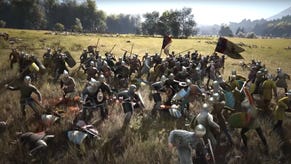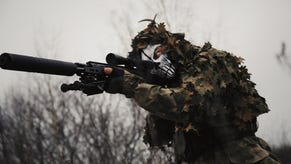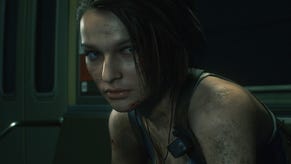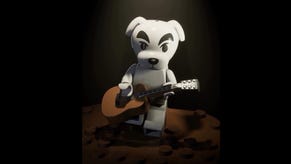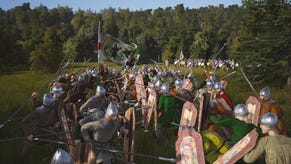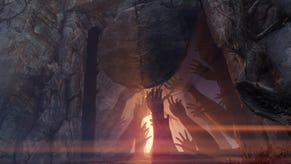The writer who left BioWare: Eurogamer interviews Drew Karpyshyn
On poor fiction, text versus graphics, KOTOR, the Mass Effect 3 ending and Children of Fire.
Drew Karpyshyn not only resembles Commander Shepard facially - he created him. Drew Karpyshyn was one of BioWare's greatest ever writers. He was lead writer of cherished Star Wars role-playing game Knights of the Old Republic, and he was lead writer of Mass Effect 1, 2, and all the books in-between (not Deception). Along the way, Karpyshyn also influenced Baldur's Gate 2: Throne of Bhaal, Neverwinter Nights, Jade Empire and massive storied MMO Star Wars: The Old Republic - a job that meant he couldn't be a part of Mass Effect 3.
But in February, Drew Karpyshyn walked away from BioWare, and video games, after 12 decorated years. He left to pursue literary goals - chiefly, his original Children of Fire trilogy. But he left BioWare on shaky ground. Mass Effect 3 was great, but will be remembered for the furore surrounding the ending. Star Wars: The Old Republic was an incredible achievement, but it will be remembered as the expensive gamble that went free-to-play within a year. BioWare's reputation seems to be challenged at every corner.
With those issues bubbling in the cauldron, as well as accusations of triple-A budgets stifling creativity and a new literary career to consider, I thought it high time I tracked down Drew Karpyshyn for a chat.
On it being "a poor, poor five years for fiction in the video game industry"

That was the controversial statement made by Half-Life 2 City 17 and Dishonored creator Victor Antonov, and it provoked a number of responses. I hoped Karpyshyn, given his role as a creator of fiction - fiction released within the last five years (Mass Effect 1 - 2007, Mass Effect 2 - 2010, Star Wars: The Old Republic - 2011) - might have something to say about it.
"Obviously everyone is entitled to their opinion," he told me, "but this feels like he's actually hyping his own game rather than making a true critical assessment of the industry.
"I agree that there has been a glut of sequels and more focus on 'action' games recently, and there are many games in the industry that don't tell interesting stories. But it's also easy to find examples that buck this trend. For this particular article, he's trying to emphasise story as a stand-out feature for his upcoming project, so it makes better ad copy to say how terrible everything else is - it positions them as the 'saviours' of the industry, even if the industry doesn't really need saving."
On the evolution of game writing and graphics
Game graphics are better now, but can you say the same for writing? Will any BioWare series be as fondly remembered among die-hard fans as Baldur's Gate? Drew Karpyshyn watched the evolution, first-hand, from text to graphics. So, what that was like and, more importantly, was it a step forwards?
"In our early games, dialogue was still mostly read off the screen, not spoken by voice actors. As a result, the writing felt more 'bookish', and less 'screenplay', if that makes sense. As we got better voice acting and digital acting, we had to adapt to take advantage of things like an actor's performance or a character's facial expression - we had to learn to draw on the subtle nuances that weren't available when we first began. As a result, our writing became more efficient and focused," Karpyshyn noted.
"An old-school game like Baldur's Gate 2 could never be made with full voice acting - there's too much dialogue, and the budget would break any studio."
Drew Karpyshyn
"When it all comes together - voice acting, digital acting, writing, music - we get amazing stuff, like the Sovereign conversation in Mass Effect 1. But it's also harder as a writer to maintain creative control - the more elements that are involved, the more people you have putting their stamp on it. That's great when it works, but it can also be frustrating. And it's much, much more expensive, which is why an old-school game like Baldur's Gate 2 could never be made with full voice acting - there's too much dialogue, and the budget would break any studio."
We're on the cusp of a new generation of hardware, which will have more graphical power than ever before. 2K Games boss Cristoph Hartmann made the unfavourable comment that games wouldn't be able to produce emotional nuance like Brokeback Mountain did until games got closer to photorealism. BioWare has been at the forefront of emotional, cinematic storytelling - so, what does Drew Karpyshyn think?
"If that were true, then no animated feature could ever convey emotion. Tell that to Disney and Pixar - they seem to get along okay without photorealism," he answered.
"The actual danger is falling into the uncanny valley. If you push too close to photoreal but come up just short, it's hard for viewers to reconcile what they see with what they expect - eyes look cold and dead, or motions seem slightly askew or artificial. That's a real problem as digital graphics advance. However, if you go with a more stylised approach, then audiences react differently. They don't expect a cartoonish character to have perfectly realistic traits, and their brains don't recoil at the almost imperceptible irregularities that are so jarring with near-photoreal graphics."
Drew Karpyshyn won't be a part of the next-generation of console gaming, having retired from the industry. But he doesn't foresee anything greatly affecting the course his craft already seems intent upon.
"I imagine we'll see a continued progression along the lines of what we've experienced over the past decade," he shared, "but it's hard for me to imagine any kind of major revolution or change. Game writing will evolve slowly and in small increments; I don't foresee any kind of watershed moment that will forever change the way things are done because of any hardware or technical advances."
On Knights of the Old Republic, villains and LucasArts
Karpyshyn's Darth Revan and Darth Malak from Knights of the Old Republic are not only part of a story and game that's regarded as one of BioWare's best (9/10 Eurogamer) - they're part of a game that's considered one of Star Wars' best. Presumably, one does not simply dream up a Sith Lord overnight. So, how does a Revan come about?
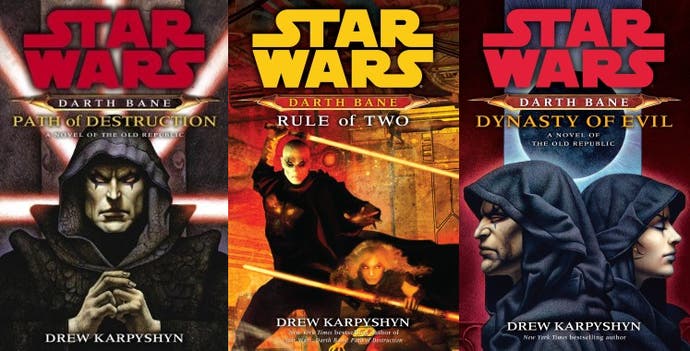
"Revan evolved naturally over the course of working on the original Knights of the Old Republic game. It's difficult to say 'here's how we did it', because it was a long, collaborative process," Karpyshyn explained. "We thought about interesting iconic villains, we tried to imagine new twists on the idea of good vs evil, and we rewrote and reworked our ideas over and over. That's the BioWare process.
"We did have LucasArts approving things along the way, but the creativity came from BioWare. As for George Lucas himself, I don't know if he was involved in any way - I think he focuses more on the movies and television rather than video games."
"I do remember we had thought about using clones in some way for the plot, but LucasArts killed that idea, since Attack of the Clones was already being planned and they didn't want us to tread in the same waters as the film."
Drew Karpyshyn
By the time Karpyshyn joined BioWare in 2000, the contract to make Knights of the Old Republic - released in 2003 - "had already been put in place with LucasArts - so I don't even know who approached who first". Karpyshyn wasn't involved in the initial conversations about the game, but does remember LucasArts pooh-poohing one idea.
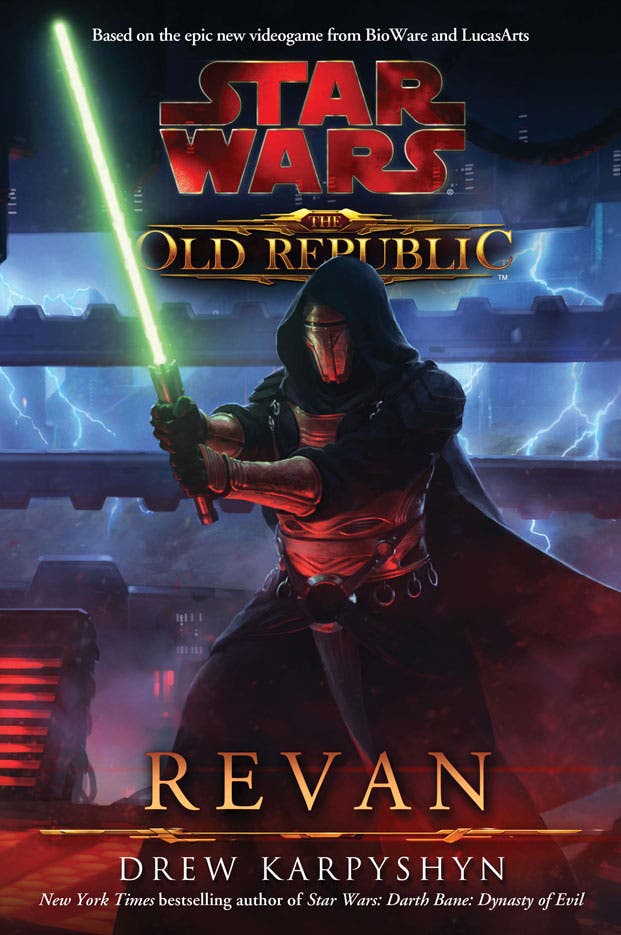
"Wow, you're asking me to recall the earliest meetings from over a decade ago? Keep in mind, I've done many, many projects since then - the creative origins and process for each project gets pushed down deeper and deeper with each new project. You can only store so much, so you have to 'flush' things regularly as a creative artist, otherwise you get stuck in a rut. So I can't honestly remember the beginnings in any kind of detail," he begun.
"I do remember we had thought about using clones in some way for the plot, but LucasArts killed that idea, since Attack of the Clones was already being planned and they didn't want us to tread in the same waters as the film."
As strong as Revan, Malak and Knights of the Old Republic turned out to be, there are many who preferred the characters of Obsidian-developed sequel, Knights of the Old Republic 2 - particularly Kreia, your mentor and guide. A diplomatic Karpyshyn admitted he was biased towards Malak and Revan, but acknowledged there had been "a number of great villains" in the series. He didn't mention any from Star Wars: The Old Republic, however, but he did mention Darth Bane - a character he created in novels for LucasArts.
Nevertheless, Karpyshyn regards Darth Vader above all others, as "probably the most iconic villain in Western cinematic culture and in sci-fi in general".
On Mass Effect 3, that ending and backlash
BioWare once intended Mass Effect 3 to end differently than it did. One possible ending concerned the spread of Dark Energy - a force used for mass effect fields and biotic powers. It goes that Reapers were created to stop the spread of Dark Energy, which would ultimately destroy everything. That's why Reapers, every 50,000 years or so, processed (turned into a Reaper) an entire species - to slow the spread of Dark Energy. The Human Reaper was to be the last throw of the dice for the Reapers. The ending of Mass Effect 3 would be you deciding whether to sacrifice the entire human race, and create a Human Reaper, or take your chances that humanity could come up with another alternative.
That ending, Drew Karpyshyn came up with. It was one of several, apparently.
In response to that being aired, Drew Karpyshyn wrote a lengthy blog post on his website. "Yes, we had a plan, but it was very vague. We knew we wanted to focus on some key themes and bring in certain key elements: organics vs synthetics; the Reapers; the Mass Relays. Beyond that, we didn't go into detail because we knew it would change radically as the game continued to evolve," he explained.
He revealed that Cerberus had been "basically a throwaway group of pro-human radicals" used to add spice to some Mass Effect 1 side-missions. "We didn't even have a concept of who was running them," Karpyshyn shared, "and we didn't think they were that important. Obviously, by the time of my Ascension novel and ME2, that had changed radically. The Illusive Man and Cerberus became central to the story and themes - that never would have happened if we had nailed everything down and refused to make changes to the story."
"From what I've heard, [BioWare] did go in a different direction than what we had originally planned, but that's not surprising - projects evolve, and you rarely end up in the place you expected when you first started."
Drew Karpyshyn
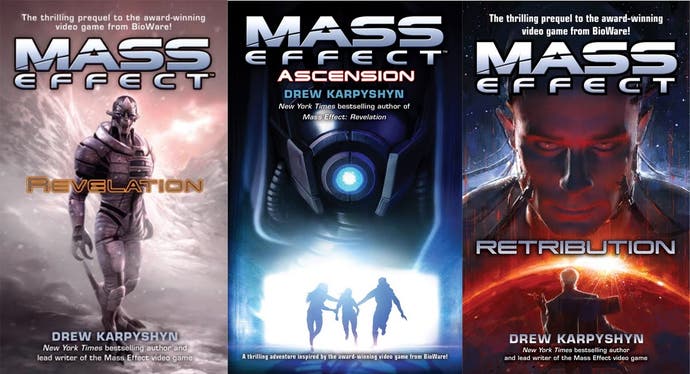
"So," his post concluded, "I don't like to say 'here's what we originally were thinking', because it gives a false and very distorted impression of the process. Mass Effect was the creation of a huge team, with contributions coming in from many people at many stages of the project. Some things I liked ended up getting cut, some stuff I wasn't sure of worked its way in. That's the nature of the beast with collaborative works, and in the end it makes the final product stronger.
"But talking about the changes after the fact feels like I'm sitting on my throne and proclaiming, 'That's not what I would have done!' It's easy to sit on the sidelines and say 'I would do this or that', but it's very different when you're part of the process, working with multiple ideas, trying to piece it all together and still hit your deadlines.
"Anyone who wasn't part of the ME3 team is an outsider - even me - and whatever they say about the creation of the game is just unsubstantiated speculation."
Drew Karpyshyn hadn't had time to play Mass Effect 3 when he wrote that post in March. Unfortunately, he still hasn't.
"I still haven't played ME3, so I don't want to comment on it. My schedule is packed for the next year or so - I've just finished another Star Wars book (Star Wars: Annihilation, due November), and I'm currently working on my own original fantasy trilogy. That doesn't leave me a lot of time to play games," he told me.
"From what I've heard, they did go in a different direction than what we had originally planned, but that's not surprising - projects evolve, and you rarely end up in the place you expected when you first started."
Under immense fan pressure, BioWare chose to extend the Mass Effect 3 ending. Was it right from an artistic integrity standpoint to do that? To my mind, it looked like a partial admission of guilt.
"Again, this is something I don't really want to comment on. Not being part of the team means I don't know what the original plan was, or how they reacted to or interpreted the fan reaction," tiptoed Karpyshyn.
"I will point out that this has happened before, and not just in video games. Movies often re-shoot endings based on test audiences, and Arthur Conan Doyle was forced to resurrect Sherlock Holmes after fans were outraged by his death in one of his books.
"Whether these changes are an admission that something was wrong is really up to the artists involved, so I don't feel comfortable weighing in as an outsider."
"Movies often re-shoot endings based on test audiences, and Arthur Conan Doyle was forced to resurrect Sherlock Holmes after fans were outraged by his death in one of his books. Whether these changes are an admission that something was wrong is really up to the artists involved, so I don't feel comfortable weighing in as an outsider."
Drew Karpyshyn
It must have been tough for Mass Effect 3 writers facing the ire of fans. Here are the very people they'd spent years crafting a story for, hoping that they would enthral and entertain. I asked Drew Karpyshyn what it was like to face negative feedback like this.
"Every project I've ever done has lots of negative feedback and lots of positive feedback. That's the nature of the beast," he remarked, "not everybody likes the same thing.
"That's why I write things that I personally like and am proud of. Trying to guess what people will like or dislike is a fool's game; as an artist you want something you are proud of. That makes it a lot easier to withstand the criticisms. Fortunately, everything I've worked on so far has fallen under that umbrella, so I've never had anything I've regretted or been ashamed of."
By the time critical reaction to a game comes in, Karpyshyn revealed, "we're many, many months away from the actual writing". "Usually, by the time people start seeing something and giving feedback, I'm well into the next project, so you kind of tend to stay focused on that," he told us. "Of course you are aware of the general reaction, and you do read people's posts and comments online. But any pride or anger you get is rather fleeting - it's not something that leaves a memorable impression or an indelible memory."
On Children of Fire, the trilogy of books he left BioWare to finish
Drew Karpyshyn has been working on his original Children of Fire trilogy, "sporadically", for several years. Working on it full-time was one of the main reasons he left BioWare. In an April-dated post on his website he shared details about the books. Children of Fire is not science fiction - "it's classic fantasy". Karpyshyn doesn't like doing comparisons, but has been influenced by George RR Martin, Terry Brooks, David Eddings and Guy Gavriel Kay.
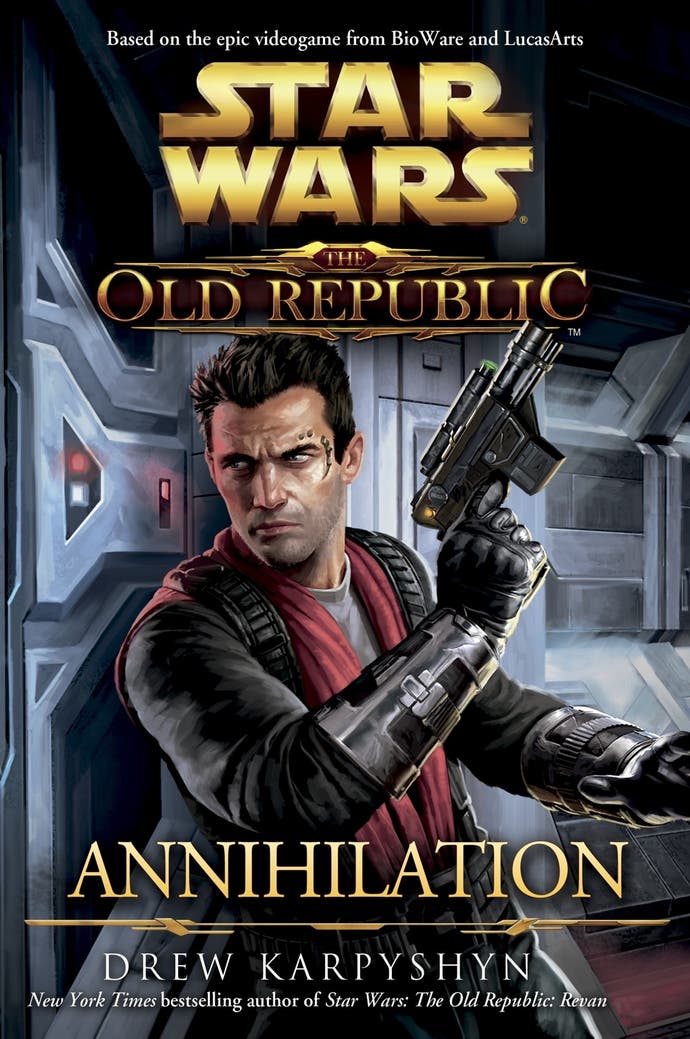
"Like most of my novels, Children of Fire has multiple point-of-view characters, and the line between good and evil is frequently blurred," he summarised. "This isn't a fairy tale with classic morality; things are messy and muddled. I also put a lot of emphasis on action and moving the plot along. My pet peeve with fantasy is chapter after chapter of wandering down the road, singing songs, looking at flowers and trees and describing every damn meal - I just want to get to the important stuff! (I'm an impatient reader, and I've been accused of being an impatient writer. But I am what I am.) I can promise you this - Children of Fire is never boring."
Here's his "jacket blurb" for the first book, Children of Fire.
"It's exciting to be working on an a world that is completely of my own invention and over which I have total creative control ... With Children of Fire, I can be a creative glutton - there is no give, it's all take. I do what I want, when I want. It's very liberating."
Drew Karpyshyn
Karpyshyn signed a deal with Del Rey to publish the entire Children of Fire trilogy, and the first two books - Children of Fire and The Scorched Earth - will be released in 2014. Chaos Unleashed, the final instalment, will arrive nine to 12 months later.
In a more recent post, dated July, Karpyshyn wrote: "Children of Fire is coming along nicely. It's exciting to be working on an a world that is completely of my own invention and over which I have total creative control. Star Wars is great, but I'm not the one who calls all the shots for that universe (nor should I be). It was around when I was still in grade school, so I'm just happy to be a tiny cog in the machine. With Mass Effect, I had a lot more influence, but it was still a collaborative project, and there was always give and take.
"With Children of Fire, however, I can be a creative glutton - there is no give, it's all take. I do what I want, when I want. It's very liberating."
Given Drew Karpyshyn's background, I wondered how he felt about the possibility that one day, the Children of Fire trilogy could be spun into a series of games.
"That would be kind of cool," he mulled, "but that's not really something I'm looking for. My focus is on writing an incredible series of books. If somebody ever wants to turn them into a video game series, I'll worry about it then, but I'll be perfectly satisfied if that never happens. And even if it does, I don't know if I'd be the one to work on that project. I could very well be involved in something else entirely... or maybe I'd be free to do it. You never know what the future might hold."
On never saying never
How BioWare will fare without Drew Karpyshyn, we will come discover. How Drew Karpyshyn will fare without BioWare, we will also come to know in time. But the two may not be parted for good.
"I never say never, so it's possible I will go back," he admitted. "Right now, I'm focusing on my novels, and I don't feel that urge to return to games. But down the road if the bug returns, I might take another crack at games. And if I ever do, BioWare is probably the most likely place for my return.


